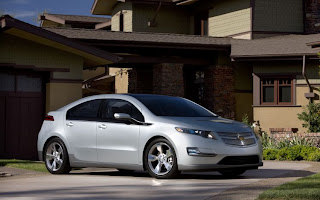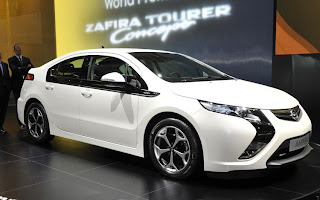2012 Opel Ampera
On the surface the Ampera and its mechanical twin - the Chevrolet Volt - appear somewhat different, but underneath their skin they're practically identical. Built alongside the Volt in Hamtramck, Michigan, the two differ only by means of front and rear fascias, wheel designs, and some interior trim. Beneath the skin, both share the same 16-kWh lithium-ion battery pack, and the same 1.4-liter turbocharged I-4, which primarily serves as a so-called range extender.
Ampera owners do receive one feature absent on U.S.-spec Volts. In typical operation, both cars are designed to use existing battery power to drive the car before activating the gasoline engine. Ampera owners, however, will have the option of selecting a so-called charge hold mode, prompting the car to run the engine and preserve the battery's charge for a later run.
Unusual, perhaps, but there is some method behind the madness. In Europe, this allows Ampera drivers to save their EV range for entering urban areas, which tax (or even ban) gasoline-powered vehicles. In central London, for instance, drivers using non-electric vehicles are charged nearly $16 to drive through congestion zones. Using electricity, however, allows drivers to avoid the fee.
We think the feature could have a place in North America, however. Drivers facing a long commute on the highway before entering a congested city center could use the engine to efficiently generate power for the drive motor (and occasionally drive the front wheels), all while reserving the car's EV range for city-cycle driving.
Volt owners, however, may never have the chance to sample the feature. Although GM has reportedly considered adding the charge hold mode to U.S.-spec cars, the feature has yet to be approved for production. Volt powertrain engineer Tony Posawatz has told other publications that charge hold "is a feature I wish we could have [in North America]," suggesting hurdles - perhaps related to EPA certification - are preventing it from coming stateside. The Volt is equipped with a mountain mode that reserves some additional battery power for use on steep grades, but it doesn't allow drivers to postpone EV operation altogether.
Ampera owners do receive one feature absent on U.S.-spec Volts. In typical operation, both cars are designed to use existing battery power to drive the car before activating the gasoline engine. Ampera owners, however, will have the option of selecting a so-called charge hold mode, prompting the car to run the engine and preserve the battery's charge for a later run.
Unusual, perhaps, but there is some method behind the madness. In Europe, this allows Ampera drivers to save their EV range for entering urban areas, which tax (or even ban) gasoline-powered vehicles. In central London, for instance, drivers using non-electric vehicles are charged nearly $16 to drive through congestion zones. Using electricity, however, allows drivers to avoid the fee.
We think the feature could have a place in North America, however. Drivers facing a long commute on the highway before entering a congested city center could use the engine to efficiently generate power for the drive motor (and occasionally drive the front wheels), all while reserving the car's EV range for city-cycle driving.
Volt owners, however, may never have the chance to sample the feature. Although GM has reportedly considered adding the charge hold mode to U.S.-spec cars, the feature has yet to be approved for production. Volt powertrain engineer Tony Posawatz has told other publications that charge hold "is a feature I wish we could have [in North America]," suggesting hurdles - perhaps related to EPA certification - are preventing it from coming stateside. The Volt is equipped with a mountain mode that reserves some additional battery power for use on steep grades, but it doesn't allow drivers to postpone EV operation altogether.














